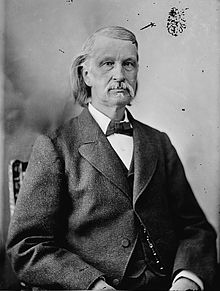
Back هوراس ماينارد Arabic هوراس ماينارد ARZ هوراس ماینارد AZB Horace Maynard German Horace Maynard French הוראס מיינרד HE Horace Maynard Italian ホーレス・メイナード Japanese Horace Maynard Swedish
Horace Maynard | |
|---|---|
 | |
| 28th United States Postmaster General | |
| In office June 2, 1880 – March 4, 1881 | |
| President | Rutherford B. Hayes |
| Preceded by | David M. Key |
| Succeeded by | Thomas James |
| United States Minister to the Ottoman Empire | |
| In office June 12, 1875 – July 15, 1880 | |
| President | Ulysses S. Grant Rutherford B. Hayes |
| Preceded by | George Boker |
| Succeeded by | James Longstreet |
| Chairman of the House Republican Conference | |
| In office March 4, 1873 – March 3, 1875 | |
| Speaker | James G. Blaine |
| Preceded by | Austin Blair |
| Succeeded by | George W. McCrary |
| Member of the U.S. House of Representatives from Tennessee | |
| In office July 24, 1866 – March 3, 1875 | |
| Preceded by | Self (1863) |
| Succeeded by | Jacob M. Thornburgh (2nd) |
| Constituency | 2nd district (1866–1873) At-large district (1873–1875) |
| In office March 4, 1857 – March 3, 1863 | |
| Preceded by | William H. Sneed (6th) |
| Succeeded by | Self (1866) |
| Constituency | 2nd district |
| Personal details | |
| Born | August 30, 1814 Westborough, Massachusetts, U.S. |
| Died | May 3, 1882 (aged 67) Knoxville, Tennessee, U.S. |
| Resting place | Old Gray Cemetery |
| Political party | Whig (Until 1856) American (1856–1858) Opposition (1858–1860) Unionist (1861–1866) Unconditional Union (1866–1867) Republican (1867–1882) |
| Spouse | Laura Washburn |
| Relatives | Martha Tracy Owler (niece) |
| Education | Amherst College (BA) |
| Signature | |
Horace Maynard (August 30, 1814 – May 3, 1882) was an American educator, attorney, politician and diplomat active primarily in the second half of the 19th century. Initially elected to the House of Representatives from Tennessee's 2nd Congressional District for the term commencing on March 4, 1857, Maynard, an ardent Union supporter and abolitionist,[1] became one of the few Southern congressmen to maintain his seat in the House during the Civil War. Toward the end of the war, Maynard served as Tennessee's attorney general under Governor Andrew Johnson, and later served as ambassador to the Ottoman Empire under President Ulysses S. Grant and Postmaster General under President Rutherford B. Hayes.[2]
Maynard left his teaching position at East Tennessee College in the early 1840s to pursue a career in law, and quickly developed a reputation among his peers for his reasoning ability and biting sarcastic style.[2] He spent much of his first two terms in Congress fighting to preserve the Union, and during the Civil War, he consistently urged President Abraham Lincoln to send Union forces to free East Tennessee from its Confederate occupiers.[3] Maynard returned to Congress after the war, but being a Republican in a Democrat-controlled state, he struggled in statewide elections.[2]
- ^ Cite error: The named reference
mckenziewas invoked but never defined (see the help page). - ^ a b c Oliver P. Temple, Notable Men of Tennessee, From 1833 to 1875, Their Times and Their Contemporaries (New York: Cosmopolitan Press, 1912), pp. 137-149.
- ^ Oliver P. Temple, East Tennessee and the Civil War (Johnson City, Tenn.: Overmountain Press, 1995), pp. 437-441.
© MMXXIII Rich X Search. We shall prevail. All rights reserved. Rich X Search